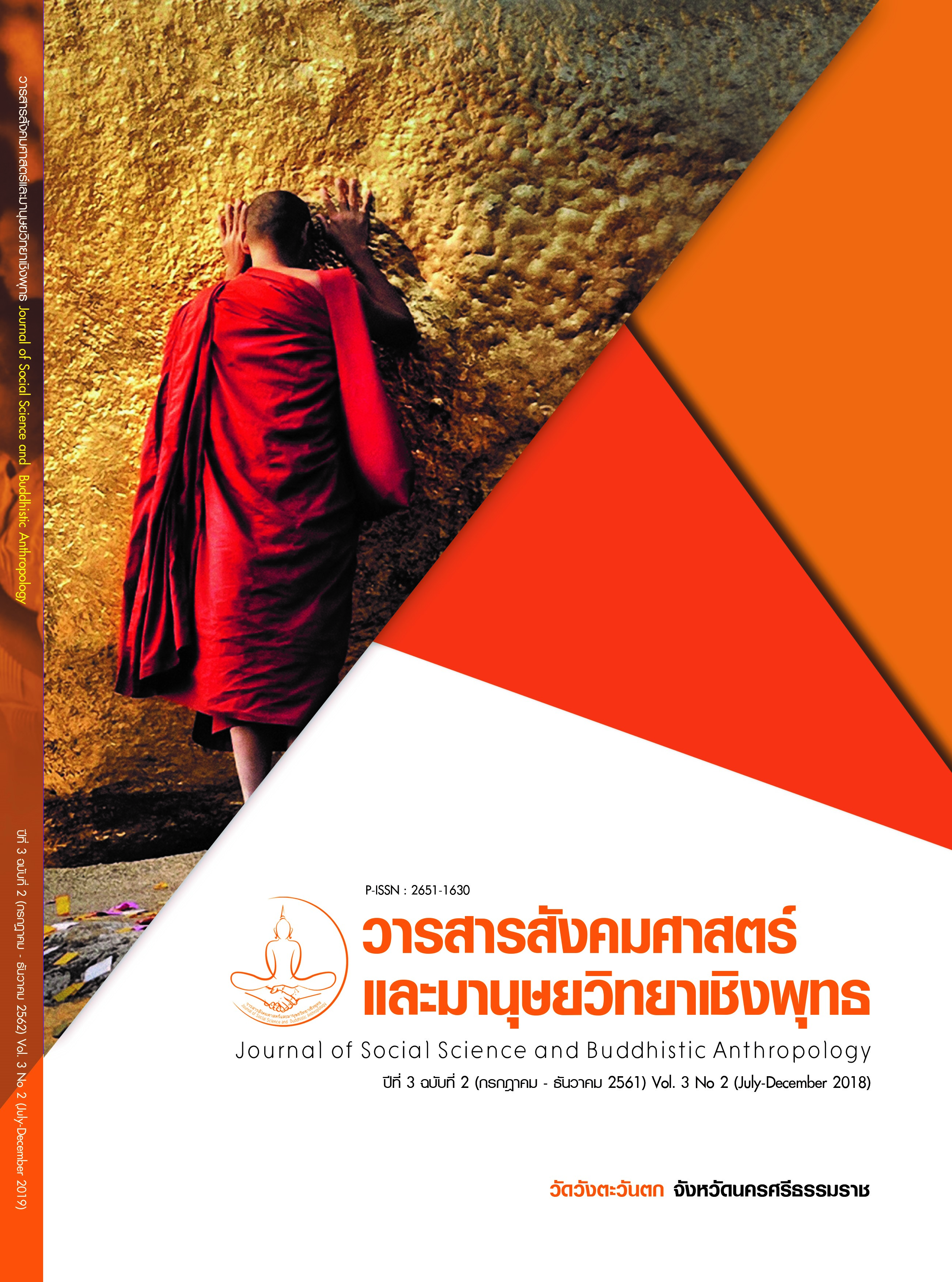BUDDHIST ECCLESIASTICAL MONK' S OPINION TO A LEADER STATE ACCORDING TO SUPPURISA DHAMMA 7 OF PRARACHAWARAWETEE (CHIT TIKKHAPANYO) A LEADER OF SONGKLA PROVINCE
Keywords:
Buddhist ecclesiastical, monk' s opinion, a leader state according, tosuppurisadhammaAbstract
The objectives of this research were as follows 1) To study on leadership according to Sappurisadhamma of Phrarachawarawetee (Chit Tikkhapanyo), the Songkhla ecclesiastical provincial leader.2) Tocompare the leadership according to Sappurisadhamma of Phrarachawarawetee (chit Tikkhapanyo), the Songkhla ecclesiastical provincial leader in terms of pesiods of monkhood, educations and posit ion experiences. 3)To study on theguideline to promote leadership according to Sappurisadhamma of Phrarachawarawetee (Chit Tikkhapanyo), the Songkhla ecclesiastical provincial leader. This is the quantitative research. And 4) to create new knowledge and leadership system of 7 Suppurisa Dhamma with Sappurisadhamma of Phrarachawarawetee (Chit Tikkhapanyo), the Songkhla ecclesiastical provincial leader. The study was a quantitative research. The population were composed of ecclesiastics for 88 persons, sample sise by krejcie and Morgan’s table measurement, the samples were about 88 persons, simple random sampling was used. The dataanalysis by the following statistics; percentage, arithmetic mean, standard deviation, T-test, F-test and to test the differentiation in each pair by LSD method (Least significant difference).
The findings were as follows:
The leadership according to Sappurisadhamma of Phrarachawarawetee (Chit Tikkhapanyo), the Songkhla ecclesiastical provincial leader by overview was at more level when considered in each aspect found that the aspedt of Puggalaparoparanyata (to know people) was the highert mean and followed up the aspect of Kalanyuta (to know time ) and the aspect of Parisanyuta (to know community and society) war the lowest mean. The comparative on opinion of leadership according to Sappurisadhamma of Phrarachawarawetee (Chit Tikkhapanyo), the Songkhla ecclesiastical provincial leader in terms of periods of Monkhood, educations and as statisticacally significance at –05. The suggestions on guideline to promote leadership according to Sappurisadhammawer as follows. The aspect of Dhammanyata; there should nave policy for giving understanding to all Sanghas. The aspect of Atthanyuta; there should have meeting of Sanghas, seminar or training for new creative concepts in Sangha affairs. The aspect of Mattanyuta; the ecclesiastics should emphasize and and follow the disciplines.The aspect of Kalanyuta; the ecclesiastic should make important on work and regarding on Sangha’s interests. The aspect of Parisanyuta; the ecclesiastic should be disemination of Dhamma and meeting people throughout arrangement of Dhamma practices or have activities for participation of people and harmony. Theaspect of Puggaloparanyuta; there should have assigned personel in position as suitable and secretary should be on suitability with mission of SanghaThe leadership according to Sappurisadhamma of Phrarachawarawetee (Chit Tikkhapanyo), the Songkhla ecclesiastical provincial leader by overview was at more level when considered in each aspect found that theaspedt of Puggalaparoparanyata (to know people) was the highert mean and followed up the aspect of Kalanyuta (to know time) and the aspect of Parisanyuta (to know community and society) war the lowest mean. The last one, to create new knowledge and leadership system system of Suppurisa Dhamma with Sappurisadhamma of Phrarachawarawetee (Chit Tikkhapanyo), the Songkhla ecclesiastical provincial leader that including with planning, management, direction and supervision.
References
จันทรานี สงวนนาม. (2545). ทฤษฎีและแนวปฏิบัติในการบริหารสถานศึกษา. กรุงเทพมหานคร: บุ๊คพอยท์.
ปรีชา ช้างขวัญยืน และคณะ. (2542). เทคนิคการเรียนและผลิตตำรา. กรุงเทพมหานคร: จุฬาลงกรณ์มหาวิทยาลัย.
สัมมา ธรนิตย์. (2556). หลักทฤษฎีและปฏิบัติการบริหารการศึกษา. กรุงเทพมหานคร: ข้าวฟ่าง.
สำนักงานคณะกรรมการการศึกษาขั้นพื้นฐาน. (2553). คู่มือการบริหารจัดการระบบคุณภาพ. กรุงเทพมหานคร: โรงพิมพ์ชุมนุมสหกรณ์การเกษตรแห่งประเทศ.
สำนักนโยบายและยุทธศาสตร์ สำนักงานปลัดกระทรวงศึกษาธิการ. (2554). การศึกษานำร่องการใช้รูปแบบการบริหารจัดการการศึกษา เพื่อพัฒนาคุณภาพของผู้เรียนในสถานศึกษา. กรุงเทพมหานคร: โรงพิมพ์ สกสค. ลาดพร้าว.
อุทัย หิรัญโต. (2531). หลักการบริหารงานบุคคล. กรุงเทพมหานคร: โอเดียนสโตร์.









